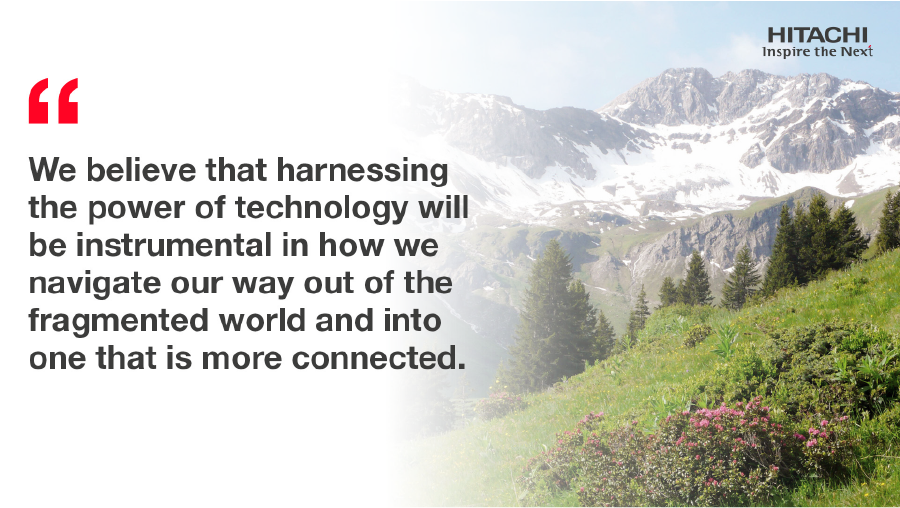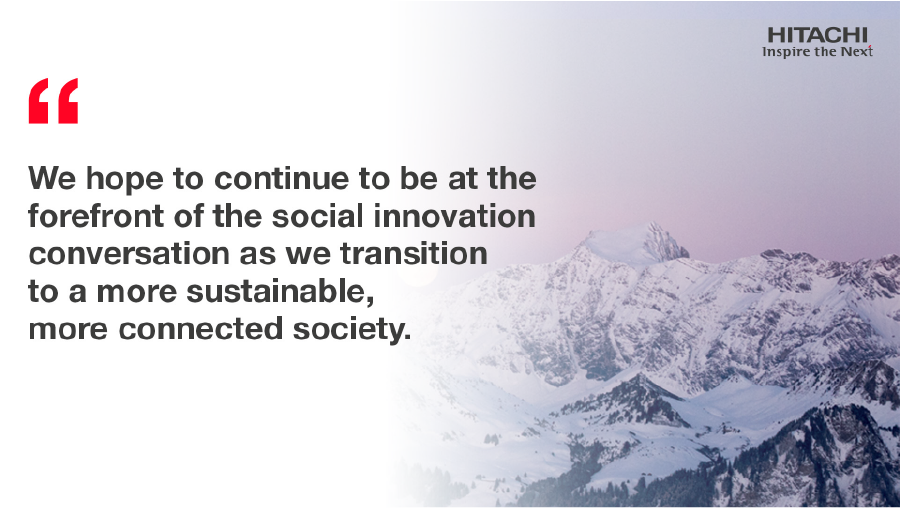Conversations at the World Economic Forum Annual Meeting this year focused on understanding and solving the complex and interconnected geopolitical, societal and environmental risks to our way of life.
But despite the scale of the issues we face, Davos 2023 was full of optimism around the emerging solutions available as we embrace the digital world to help us understand and improve the physical one.
Hitachi senior executives attending the event met with business leaders, stakeholders and government officials from around the world to further strengthen the potential for more collaboration on social innovation.
Speaking to NHK during Davos, Hitachi’s chairman Toshiaki Higashihara said he believes that Japanese companies are advanced in “manufacturing strength and digital technology, as well as technology in the environmental field”, which is an important offering to the world as we look to a more sustainable future.
Executive Vice President Alistair Dormer spoke at Bloomberg’s roundtable on the power of technology as a sustainable solution, while Hitachi India Managing Director Bharat Kaushal discussed the enormous potential and optimism surrounding India this year. And Hitachi subsidiary GlobalLogic will be launching centers in Spain after a meeting with prime minister Pedro Sánchez.
Hitachi’s VP and Executive Officer, Chief Sustainability Officer, Chief DEI Officer, Head of Global Environment Division, Lorena Dellagiovanna led discussions at the Forum’s Chief Sustainability Leaders Lunch, and spoke at DP World’s Roundtable With Chief Sustainability Officers session.
Solving these problems together with a blend of human ingenuity and technology is at the core of Hitachi’s approach to social innovation. We believe that harnessing the power of technology will be instrumental to how we navigate our way out of the fragmented world and into one that is more connected.

Here are some of the key opportunities for social innovation from Davos 2023.
The Fourth Industrial Revolution (4IR) is occurring at a whirlwind pace, blurring the boundaries between the digital and physical worlds. Artificial intelligence, the Internet of Things, automation and augmented reality are all gaining traction in manufacturing and wider society.
It is from this space that many solutions to today’s problems are emerging.
Digital ecosystems such as Lumada have a wide range of uses, as the amount of data generated by society and businesses continues to grow. And the value of that real-world data can be realized through co-creation with our customers.
The Lumada Innovation Hub is a place where people can meet in the real and virtual worlds to combine knowledge and create new value through collaboration.
And our Lumada Alliance Program helps to create partnerships that accelerate open innovation, using data to solve social issues that no company could manage alone.
Although technology is being heralded as the panacea for many of the world’s problems, the importance of a skilled and motivated workforce was another key takeaway from Davos. To effectively utilize the emerging technologies of 4IR, workers will need to be able to understand and work with these technologies, which in many cases will require a huge global effort to upskill workers.
We value the diversity of our employees and the diversity of thought within it. To leverage their unique talents, we are working to foster an inclusive and equitable environment, especially as we enter a new era of connecting technologies. Using these technologies to bring together our 350,000 employees from around the world helps us to provide value to both our customers and society as a whole.
We all have a part to play in reducing our environmental impact on the planet, and Hitachi is proud of our commitment to be carbon neutral at all business sites by FY 2030, and throughout our entire value chain by FY 2050.
The first step towards decarbonization has been to work towards minimizing fossil fuel usage through optimizing resource allocation. Transport systems are one of the largest sources of carbon emissions, and using Hitachi’s logistics vehicle-sharing initiative allows for multiple optimized joint-deliveries, saving time, money and resources while lowering excess fuel usage.
The next step is to ramp up energy-saving and renewable energy equipment before switching to 100% non-fossil fuel electricity for all business sites.
Then we will accelerate Scope 3 emissions reductions by managing the value chain, redesigning products and engaging with our key partners and customers.
We are also committed to the Alliance of CEO Climate Leaders and continue to maximize energy conservation by developing products that are environmentally focused at the design stage.
While Hitachi is focused on in-house decarbonization strategies, we are also deeply involved in rolling out decarbonization initiatives for our customers too.
Under our green strategy GX for Growth, we contribute to our customers’ decarbonization efforts by providing products and services with a low environmental burden.
We are also developing several decarbonization businesses that:
- Accelerate the energy shift towards realizing decarbonization
- Provide safe, comfortable and clean mobility
- Reduce CO2 emissions by using digital technologies to improve the efficiency of systems that underpin society
- Help to decarbonize industries and cities by creating a resilient supply chain
- Contribute to the electrification and autonomous driving of vehicles

Hitachi is committed to using our social innovation tools to help in the transition towards becoming a more sustainable business. And we continue to utilize our manufacturing, digital and environmental technology strength for our partners and customers.
We aim to remain at the forefront of the social innovation conversation as we transition to a more sustainable, more connected society that harnesses the power of collaboration.